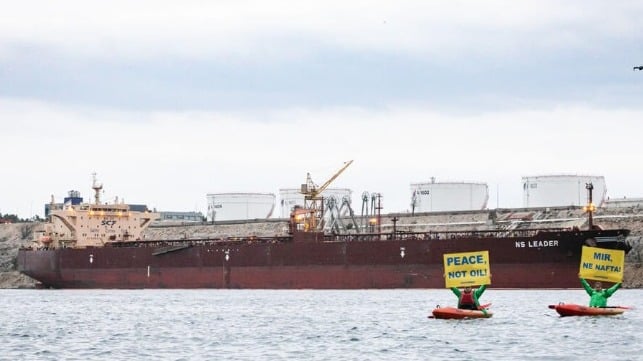Report: Tanker Makes U-Turn After U.S. Launches Sanctions

There have been questions about how effective the U.S. sanction effort is against tankers and if the enforcement of the Price Cap imposed on Russian crude oil is having an effect. Yesterday, the U.S. Treasury Department announced it was listing a tanker that it contends has repeatedly violated the $60 price cap and made five port calls in Russia in 2023, and now that tanker has changed its AIS setting to “waiting for orders.”
The NS Leader, a 115,850 dwt crude oil tanker built in 2007 was the subject of yesterday’s actions. Bloomberg was the first to report the vessel had been sailing in the Atlantic near Portugal with its destination listed as Primorsk, Russia when the sanctions were launched. Bloomberg’s data shows the vessel cut its speed in half, made a U-turn, and changed its declared destination shortly after the sanctions were announced. The AIS signal shows it was returning from a trip to India.
According to Bloomberg, this is not the first time it has happened either. They report two months ago the crude oil tanker Viktor Bakaev (118,000 dwt) undertook a similar maneuver after it was listed by the United States. In yesterday’s action, the U.S. Department of the Treasury’s Office of Foreign Assets Control highlighted that both of these tankers, along with four others that were previously listed, were all managed by the UAE-based company Oil Tankers SCF Mgmt FZCO, which was also included in yesterday’s action.
The U.S. authorities reported that Oil Tankers SCF manages oil tankers beneficially owned by the Government of the Russian Federation through Sovcomflot. They noted the Russian state-owned shipping company is also subject to the prohibitions from a previous Executive Order. The United Kingdom also sanctioned Oil Tankers SCF.
The U.S. authorities reported yesterday that the NS Leader had been used in November 2023 to transport a Russian oil cargo sold by a UAE-based company at over $80 per barrel. That company, Zeenit Supply and Trading DMCC, was also included in the enforcement effort.
Yesterday’s actions referred to the NS Leader as being owned by “Liberia-registered NS Leader Shipping,” but contended that the Government of the Russian Federation is the ultimate owner of the NS Leader. While the U.S. and several major databases including Equasis list the tanker as registered in Liberia, other databases including MarineTraffic report the NS Leader was recently transferred now sailing under the flag of Gabon.

that matters most
Get the latest maritime news delivered to your inbox daily.
The NS Leader is no stranger to controversy. A month after Russia invaded Ukraine, the tanker was docked in Omislj, Croatia unloading Russian oil. Activists from Greenpeace staged a protest against the use of Russian oil in Croatia and the European Union with the NS Leader as the backdrop. They were calling for an end to all fossil fuels but also to immediately stop the import of Russian oil.
Since the U.S. and the Western Allies began their enforcement efforts on the price cap there have been other reports of interruptions to the flow of Russian oil. Greek tanker operators have been reported to be abandoning the Russian trade for fears of retaliatory sanctions. Bloomberg and Reuters have also reported tankers and oil deliveries to India and elsewhere being delayed or deferred due to the sanction efforts.
